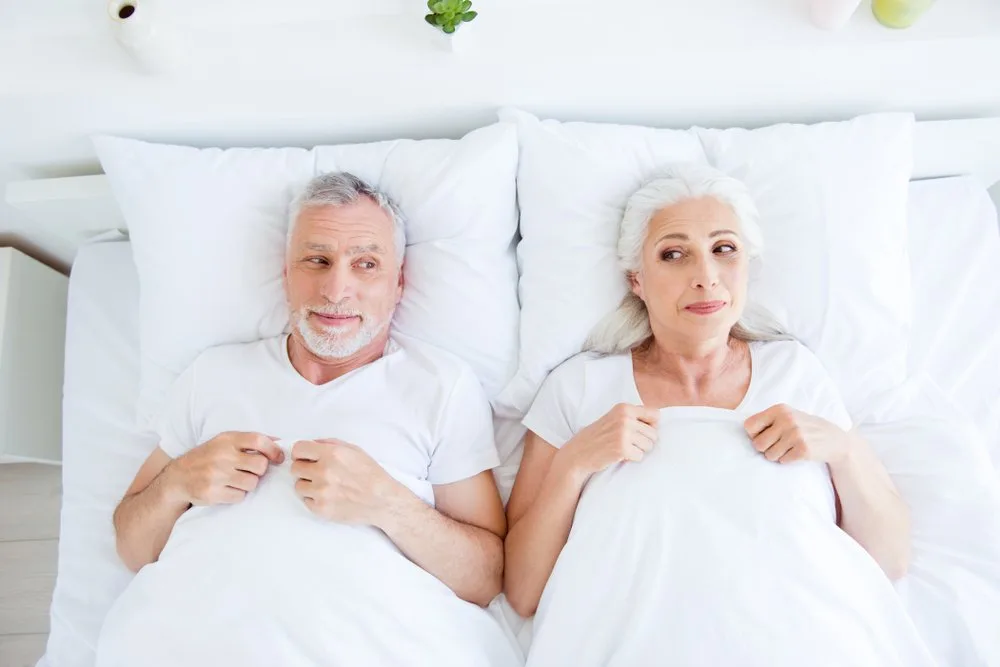An orgasm a day may be exactly what you need to keep the doctor away – and let’s be honest, we definitely prefer it to some of the medication we have to drink when we’re feeling sick. The fact is, as silly as it may sound to some, the Big O is exactly what you need to improve your health, especially during this tumultuous time.
“The brain manufactures and releases substances called neurotransmitters and neuropeptides during sexual stimulation and orgasm. These substances are wonderful for your overall physical and emotional wellbeing,” explains Nan Wise, a certified sex therapist, neuroscientist, and author of Why Good Sex Matters.
So with that said, here are more reasons as to why your pleasure needs to be the order of the day.
Health Benefits of Orgasms
1. Natural stress reliever
The past year hasn’t exactly been the best for our stress levels. Whether it’s trying to navigate a pandemic or dealing with the harsh realities of inequality, it’s clear that we’ve all been a little high-strung. However, instead of letting the stress get you down, some intimate time with your partner (or yourself) may be exactly what you need to get through the day.
According to a study published in the Psychosomatic Medicine journal, expressions of intimacy (either sexual or non-sexual) helped normalize cortisol levels within the body. Cortisol is known as the stress hormone and high levels of it can trigger weight gain, insomnia, and anxiety.
Additionally, in her book, The Orgasms Answer Guide, sexologist Beverly Whipple shares how during an orgasm, “the hormone oxytocin is released from nerve cells in the hypothalamus (a region of the brain) into the bloodstream.”
Oxytocin has been found to provide stress relief and combat high levels of cortisol (1).
2. Regulates your cycle
Aside from being annoying, irregular periods aren’t always good for your health. According to MedicalNewsToday, an irregular cycle can sometimes indicate a health problem, and some of these can lead to further problems, such as fertility issues.
However, having an orgasm may help regulate your cycle, at least according to a report from Planned Parenthood. The report found that several studies linked regular sex (once or twice a non-menstruating week) to more regular periods.
3. Great for your heart
Even in the midst of a pandemic, heart disease is still the number one killer worldwide, so you really need to be kinder to your heart. How can you do this? By quickly getting under those sheets!

Photo by Ketut Subiyanto from Pexels
According to a study published in the American Journal of Medicine, heart attack survivors who had sex more than once a week were 27% less likely to die during the 22-year study period compared with those who did not have sex at all.
4. It’s anti-aging
The post-o glow is anything but an exaggeration.
Dr. David Week is a British consultant clinical psychologist and former head of old age psychology at the Royal Edinburgh Hospital. According to a DailyMail article, after spending a decade quizzing thousands of men and women, of different ages, about their sex lives, Dr. Week found that those between the ages of 40 and 50 who had sex 50% more than other respondents looked younger.
When you’re about to reach an orgasm, your blood flow increases, and the increased amount of oxygen stimulates collagen production. Collagen is a protein found in the body that helps the skin maintain its supple and youthful appearance, so there’s no need to get Botox if you can have an orgasm instead.
5. It gives you a stronger pelvic floor
The pelvic floor refers to a group of muscles that help support your bladder, colon, and uterus. A weak pelvic floor, often triggered by pregnancy, childbirth, prostate cancer, and obesity, can lead to poor bladder function and control, reduced sensation in the vagina, constipation, and unexplained pain in the lower back, pelvis, genitals, or rectum.
Having an orgasm can help to strengthen your pelvic floor, and a stronger pelvic floor can also translate to stronger orgasms. You can also strengthen your pelvic floor with kegel exercises.
6. They make you smarter
There’s a lot of brainpower that comes with having an orgasm. As mentioned, orgasms can increase blood flow and some of that blood flows to your brain, boosting your cognitive function.
A study published in the Journal of Sexual Medicine, had female subjects masturbating while lying in an MRI machine. The machine measured blood flow to the brain. When the subjects orgasmed, the MRI found that the orgasm increased blood flow to all parts of the brain while allowing nutrients and oxygenation to travel to their noggins as well.
“I conducted research on how the brain responds to sexual stimulation and orgasm,” said Nan Wise, one of the study’s authors. “We found that orgasm increased blood flow to so many brain regions that the brain lighted up like a Christmas tree. Increased blood flow means that the brain is getting a wonderful and nutritious workout.”
A more recent, and possibly less awkward, study found similar findings. Published in the Archives of Sexual Behaviour, the study found a correlation between frequent sex and memory performance, showing that sex can improve your memory as you get older with
7. Natural painkillers
Painkillers can be addictive, and they can have an adverse effect on health. However, there are ways to address those aches and pains without having to pop a pill.
If you’re battling with a migraine, for example, then an orgasm may help to ease the pain. According to a 2013 study involving 800 migraine patients, out of the 34% that experienced a migraine attack during sex, 60% reported an improvement of their migraine attack. 70% of them also reported moderate to complete relief.
Additionally, sexologist Beverly Whipple shared with Everyday Health about a study that she had done at the Institute of Animal Behavior. For the study, Beverly and her colleagues built a human physiology lab and conducted studies on orgasms’ pain-relieving properties. They found that pressure on the G-spot elevated pain thresholds by over 47% and pleasurable stimulation increased it by more than 80%. They also found that when women had orgasms, their pain thresholds went up by more than 108%.
What’s more, research has found that an orgasm can alleviate period pains, with 70% of women revealing that regular masturbation helped to reduce the intensity of their period pains (2).

8. You’ll sleep better (when you’re done)
Trouble sleeping? Have you tried using your bed for more than just rest? It appears that some time between the sheets is exactly what you need to get some sleep.
“When you have an orgasm, you release a cocktail of hormones that help you feel relaxed and sleep better,” explains sexologist Rebecca Alvarez Story to WellandGood. “Think of this cocktail as the body’s natural sleep remedy.”
Jess O’Reilly, Ph.D., sexologist, and author of The Ultimate Guide to Seduction and Foreplay: Techniques and Strategies for Mind-Blowing Sex, echoes these sentiments.
“During sexual arousal, levels of oxytocin can increase significantly, and this can have a calming effect on the mind and body and induce a restful sleep,” she says “Some research suggests that the process of quashing sexual desire that occurs post-orgasm can result in slumber-inducing chemicals that promote some drowsiness.”
Perhaps it’s time to include the big o in your bedtime routine?

Roman Samborskyi/Shutterstock
9. Reduces risk of prostate cancer
Prostate cancer is the most likely cancer diagnosis among men with a rate of 1 in 9. Luckily, men may be able to reduce their risk by having more sex.
According to a study published in European Urology, men who ejaculate more frequently are less likely to develop prostate cancer than those who ejaculate less frequently.
10. Orgasms help you live longer

Photo by We-Vibe WOW Tech on Unsplash
This should come as no surprise, considering everything you’ve just read and more research continues to show how orgasms could be the secret to longevity.
Howard S. Friedman, Ph.D., is the author of “The Longevity Project: Surprising Discoveries for Health and Long Life”. After extensively studying research conducted on couples (he got research from a marital satisfaction study conducted by Stanford psychologist Lewis Terman in 1941), Friedman found that women who orgasmed frequently tended to live longer than those who reported being less sexually fulfilled.
Bonus: They feel really good
Even if you aren’t convinced about the health benefits that they provide, there’s no reason why you can’t enjoy an orgasm – especially when they get better as you get older.
References
Allen, M.S. Sexual Activity and Cognitive Decline in Older Adults. (2018). Arch Sex Behav 47, 1711–1719. https://doi.org/10.1007/s10508-018-1193-8
Brandis Kepler, S., Hasin, T., Benyamini, Y., Goldbourt, U., & Gerber, Y. (2020). Frequency of Sexual Activity and Long-term Survival after Acute Myocardial Infarction. The American journal of medicine, 133(1), 100–107. https://doi.org/10.1016/j.amjmed.2019.06.019
Ditzen, B., Germann, J., Meuwly, N., Bradbury, T. N., et al. (2019). Intimacy as Related to Cortisol Reactivity and Recovery in Couples Undergoing Psychosocial Stress. Psychosomatic medicine, 81(1), 16–25. https://doi.org/10.1097/PSY.0000000000000633
Hambach, A., Evers, S., Summ, O., Husstedt, I. W., & Frese, A. (2013). The impact of sexual activity on idiopathic headaches: an observational study. Cephalalgia : an international journal of headache, 33(6), 384–389. https://doi.org/10.1177/0333102413476374
Li, Y., Hassett, A. L., & Seng, J. S. (2019). Exploring the mutual regulation between oxytocin and cortisol as a marker of resilience. Archives of psychiatric nursing, 33(2), 164–173. https://doi.org/10.1016/j.apnu.2018.11.008
Rider, J. R., Wilson, K. M., Sinnott, J. A., Kelly, R. S., et al. (2016). Ejaculation Frequency and Risk of Prostate Cancer: Updated Results with an Additional Decade of Follow-up. European urology, 70(6), 974–982. https://doi.org/10.1016/j.eururo.2016.03.027
Wise, N. J., Frangos, E., & Komisaruk, B. R. (2017). Brain Activity Unique to Orgasm in Women: An fMRI Analysis. The journal of sexual medicine, 14(11), 1380–1391. https://doi.org/10.1016/j.jsxm.2017.08.014





![women [longevity live]](https://longevitylive.com/wp-content/uploads/2020/01/photo-of-women-walking-down-the-street-1116984-100x100.jpg)










